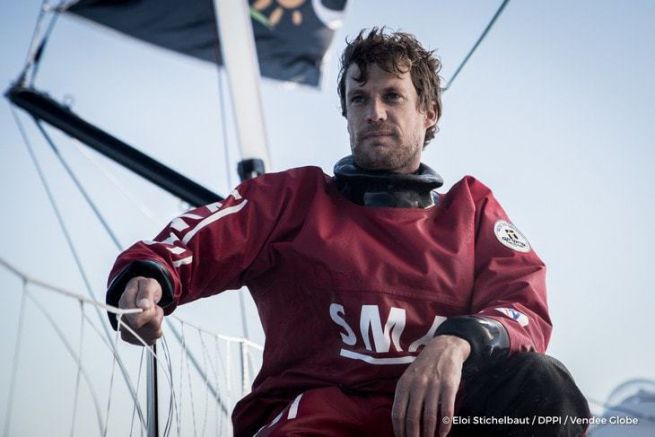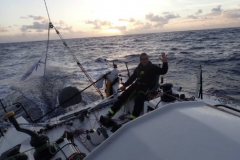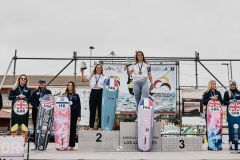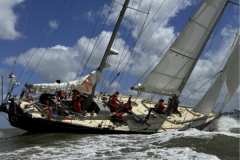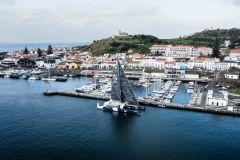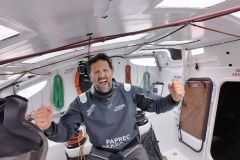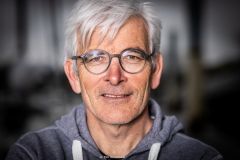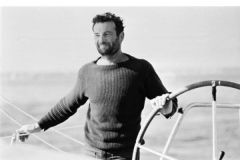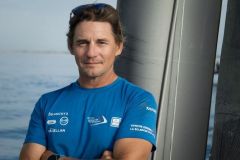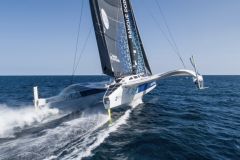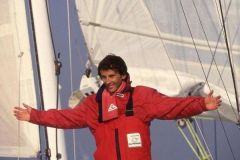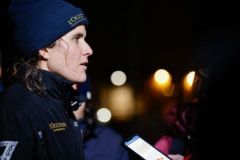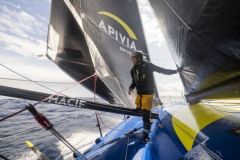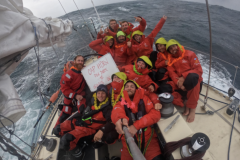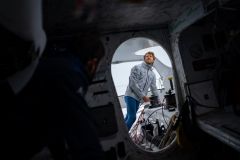This will be your first participation in the Vendée Globe, what made you want to take part?
Lots of things! I've had a passion for the sea since I was a child. I've been lucky enough to sail on a boat since my early months. And at the end of my teenage years, I made the choice to do Olympic sailing and then went off to do ocean racing and make it my profession. I've been making a living out of sailing for 10 years now.
In ocean racing, you want to do longer races on bigger boats. But it's also about opportunity. The problem with the Vendée Globe is that a lot of people would like to be able to do it, but you have to be lucky enough to find a partner who would like to do it too.
You're a freshman, but you've got quite a track record. What's your goal?
I have been discovering IMOCA racing for 1 year now ½ with the baptism of SMA in early April 2015. I used to race in the Figaro, a one-design. When you set off to race on this medium, you only have a sporting objective as there are almost never any retirements, the boats are solid..
On the IMOCA it's not the same thing! I took part in four transatlantic races and finished two of them. I had a damage on the Transat Jacques Vabre with Michel Desjoyeaux and an accident on the Transat St-Barth - Port-Le-Forêt. I also had two good transatlantic races with the Transat Anglaise and the New York - Vendée where I did 4 e on both races.

In IMOCA, it's not enough to give a sporting result. In a race like the Vendée Globe, the first objective is to finish. Unfortunately, statistically, one person in two finishes the Vendée Globe. That's not a lot. I've also prepared myself to finish this race well.
With SMA, we immediately set off on a sporting journey. I train at the Pôle France Finistère Course au Large where we do high-level sports. I've been a top-level sportsman for 10 years. There's physical preparation, weather conditions... For the past year, I've been doing it all the time. It's really a full-time professional and sporting project.
Of course I have a boat that is very efficient, as she is the one that won the last Vendée Globe four years ago. I'm training with the best in Port-La-Forêt. What's difficult today is that almost ten boats can be on the podium or win the race. What I want is to finish in those ten.
Does it change anything to set sail with the former Macif, the last winner of the Vendée Globe?
To leave with the boat that won 4 years ago is a chance because it's a great boat! It's a boat that has already sailed around the world, so we're going to say it's reliable. It gives you the confidence to set sail.
We didn't have a lot of time to prepare for the Vendée Globe, as I'm a rookie, so I'd never sailed on an IMOCA before and on top of that we were only two years old. If we had set out to build a new boat or modify a second-hand boat, we would have spent a lot of time in the yard. I wouldn't have been able to sail or learn much. To set off on this boat is really lucky!
I also have the shore crew who know the boat perfectly because there's a part of her that was there from the moment she was built, under her previous colours. After that, in terms of the pressure of results, there are 7 new boats and 10 that can win. I don't have the best performing boat in the fleet, but it's still performing. For me it's always a good point to start out on this boat again.

Have you optimized it since the buyout?
She had already been greatly optimised between the 2012/2013 Vendée Globe and the 2014 Route du Rhum, as she had already undergone some work: keel, mast, ballast configuration changed... We didn't undertake any major modifications to her. She is almost identical. That's because we had a time constraint, and on top of that we had the accident in the Transat in December 2015.
The chance was to be able to recover a boat in great condition, reliable and efficient, and to be able to sail a lot on it without spending time modifying it.
So there's no pressure to set sail with the boat that won the last Vendée Globe?
Not at all because in every Vendée Globe it's the new boats that are under pressure. On paper, they are inevitably better performing boats, as there are seven boats fitted with foils to be launched this year. So no, the pressure is theirs, not mine for sure!
How did you prepare for this Vendée Globe?
The main objective was to sail as much as possible. With a different approach between 2014 and 2015 with a Jacques Vabre project. I was lucky enough to have Michel Desjoyeaux on board SMA for 95% of my sailing. We've done about ten preparatory races during the year, such as the Guyader Grand Prix, the Armen Race, the SNSM Record, the Tour de Belle-Ile, the Fastnet... It was important to do all these races.
Then there are the training sessions of the Pole Finistère Course au Large with 5 courses of 3 days per year. It may not seem like much, but on a schedule it's already huge! We do collective sailing with a week divided into two parts. Generally on Tuesday, we sail during the day to make small comparisons and work on manoeuvres and starts.
We're also leaving for offshore navigation for an average of 24 hours. We're doing a lot more distance and we're working on the offshore speed and a few manoeuvres to get as close as possible to the race conditions.
When you're ashore, alternating with sailing, you have a lot of training, always organised by the Pole. We work on equipment, the weather, computer software or even nutrition, sleep, medical courses... It's very varied!

Physical preparation (between 3 and 5 hours per week) is also supervised by the Pôle. That's how our organization with the Cluster is organized. When there's no collective training, we sail either individually or with other boats, as we did with PRB (Vincent Riou).
One last important thing is to get the boat under construction. That allows us to train ourselves personally in mechanics, composite materials... We learn how our boat is built and how to repair it in case of problems.
I'm still forgetting a huge part which is to communicate and to go into the company to meet the employees. It's not part of the preparation for the Vendée Globe, but it's still an important part of our job, which takes up a lot of our time.
